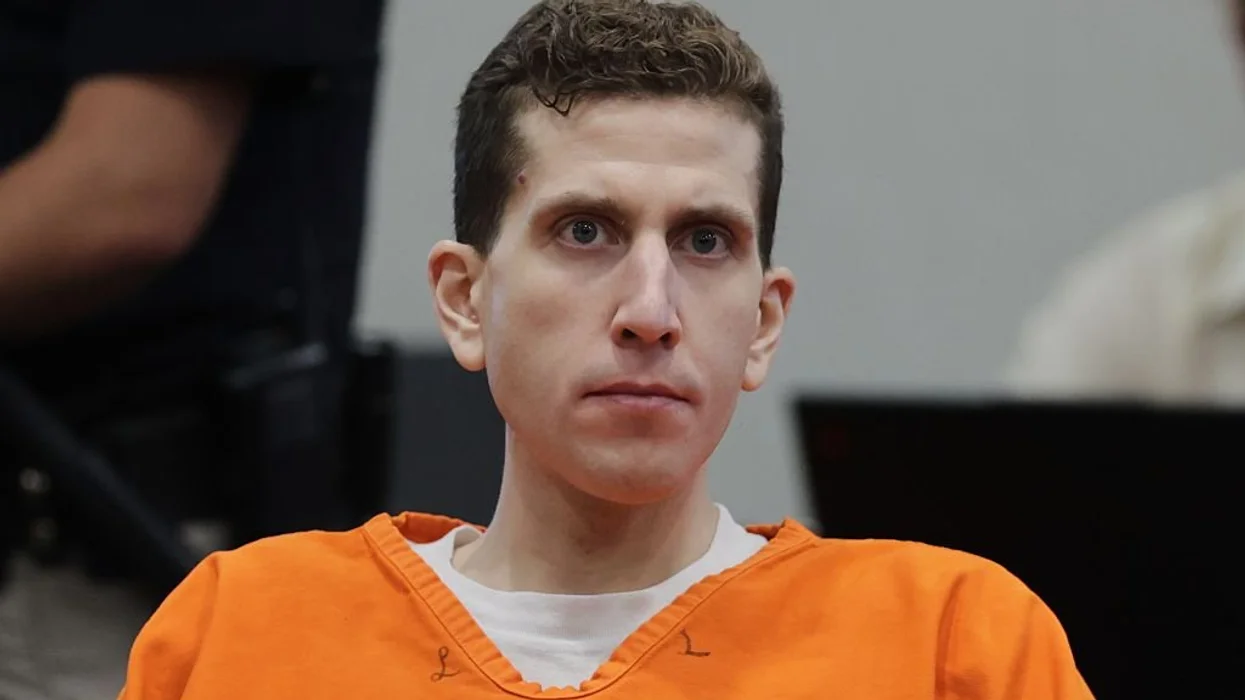 In this photo provided by Cedars-Sinai, British cosmologist Stephen Hawking, who has motor neuron disease, gives a talk titled "A Brief History of Mine," to workers at Cedars-Sinai Medical Center in Los Angeles, on Tuesday, April 9, 2013. (AP Photo/Cedars-Sinai, Eric Reed)
In this photo provided by Cedars-Sinai, British cosmologist Stephen Hawking, who has motor neuron disease, gives a talk titled "A Brief History of Mine," to workers at Cedars-Sinai Medical Center in Los Angeles, on Tuesday, April 9, 2013. (AP Photo/Cedars-Sinai, Eric Reed)
Further update:
The Associated Press provides a second update to this story, now reporting Hawking apparently is boycotting Israel.
From the AP:
British physicist Stephen Hawking has dropped plans to attend a major international conference in Israel in June, citing his belief that he should respect a Palestinian call to boycott contacts with Israeli academics.
The University of Cambridge released a statement Wednesday indicating that Hawking had told the Israelis last week that he would not be attending "based on advice from Palestinian academics that he should respect the boycott."
University officials said they had "previously understood" that Hawking's decision was based solely on health concerns — he is 71 and has severe disabilities — but had now been told otherwise by Hawking's office.
The decision means that one of the world's most famous scientists has joined a boycott organized to protest Israel's treatment of Palestinians.
----
CiF Watch also updated its story, posting the following email it received from University of Cambridge Spokesman Tim Holt, subsequent to his earlier statement that health was the reason behind Hawking’s cancellation:
“We have now received confirmation from Professor Hawking’s office that a letter was sent on Friday to the Israeli President’s office regarding his decision not to attend the Presidential Conference, based on advice from Palestinian academics that he should respect the boycott," Holt wrote per CiF Watch.
“We had understood previously that his decision was based purely on health grounds having been advised by doctors not to fly," he added.
Earlier Update:
Stephen Hawking’s decision to boycott an Israeli conference over the country’s treatment of the Palestinians was big news in Israel Wednesday morning. Almost every Israeli news site ran the item as a top story that the acclaimed theoretical physicist had dropped out of the President’s Conference scheduled for next month in Jerusalem to make a political statement.
Along with the Israeli press, the Associated Press and other news sites, TheBlaze also cited the exclusive report in the British newspaper the Guardian that Hawking’s decision to drop out of the conference was swayed by boycott Israel activists. Our earlier story also included a harshly worded reaction from the conference chairman slamming Hawking’s alleged decision.
The Guardian even inserted a poll on its site asking readers if they thought Hawking’s decision to join the academic boycott of Israel was right.
Now, University of Cambridge where Hawking is a professor has issued a statement saying Hawking canceled his Israel trip due to ill health, not ill will toward the Jewish State.
The Associated Press spoke with Tim Holt, media director at the University of Cambridge, who says Hawking's decision was based strictly on health concerns.
"For health reasons, his doctors said he should not be flying at the moment so he's decided not to attend," Holt said.
"He is 71 years old. He's fine, but he has to be sensible about what he can do,” he added.
A University of Cambridge statement released Wednesday and also reported by the AP said the decision was based on “personal reasons.”
Contradicting the Cambridge statement, organizers of the Jerusalem conference told the AP that an email from Hawking said the boycott was the reason he was not coming.
The AP quotes the Cambridge spokesman Holt saying that Hawking "did not specifically approve" a statement from the British Committee for the Universities of Palestine which was the source for the Guardian report that the boycott was the reason behind Hawking’s cancellation.
CiF Watch, a website that monitors anti-Israel content in the Guardian posted this e-mail sent to one of its readers from University spokesman Holt:
 CiF Watch asked: “The only questions which seems to remain is how long it will take for the Guardian to issue a mea culpa on their faux scoop.”
CiF Watch asked: “The only questions which seems to remain is how long it will take for the Guardian to issue a mea culpa on their faux scoop.”
Here’s our earlier report on the original story:
Acclaimed theoretical physicist Stephen Hawking has decided to join the academic boycott of Israel, canceling a highly anticipated trip to Jerusalem next month in protest of Israel’s policy toward the Palestinians.
The British newspaper The Guardian, which reported exclusively on the scientist’s decision, writes: "Hawking, 71, the world-renowned theoretical physicist and Lucasian Professor of Mathematics at the University of Cambridge, had accepted an invitation to headline the fifth annual president's conference, Facing Tomorrow, in June, which features major international personalities, attracts thousands of participants and this year will celebrate Peres's 90th birthday."
The paper added: "Hawking is in very poor health, but last week he wrote a brief letter to the Israeli president to say he had changed his mind. He has not announced his decision publicly, but a statement published by the British Committee for the Universities of Palestine with Hawking's approval described it as 'his independent decision to respect the boycott, based upon his knowledge of Palestine, and on the unanimous advice of his own academic contacts there.'"
That Shimon Peres once won the Nobel Peace Prize for securing the Oslo Peace Accords with the Palestinians did not seem to sway Hawking. The British paper reports that ever since Hawking decided to attend Peres’ conference, he was inundated with messages from boycott Israel activists urging him to reverse his decision.
The Chairman of the President’s Conference Israel Maimon tells the Hebrew news site Walla, “The use of the academic boycott on Israel is unsettling and improper, certainly for one whom the spirit of freedom is at the foundation of his human and academic mission.”
“Israel is a democracy in which everyone is able to voice their arguments, whatever they may be. Imposing a boycott is not consistent with open, democratic dialogue,” Maimon added.
Raheem Kassam who edits the pro-Israel website The Commentator writes in a post urging Hawking to reconsider his decision: “Prof. Hawking's boycott of Israel proves that even the world's greatest minds can be inherently flawed.”
Kassam writes, “I think it would be an incredible shame for you to use your stature for something so negative, fruitless and inherently discriminatory.”
"If you want to make a point about your views on the conflict in the Middle East, there could be no better platform than within the region itself. As it stands, you have simply aligned yourself with a fringe, anti-peace lobby that is concerned primarily with the demonisation of an entire people, and which is devoid of constructive ideas with which to move forward,” Kassam added.
Hawking has previously visited Israel where he met with both Israeli and Palestinian academics.
In 2009, when Israel launched Operation Cast Lead to try to stem the influx of rockets being launched by Hamas and other terror groups at Israeli communities, Hawking told al-Jazeera that Israel’s actions were “plain out of proportion.”
He also said, “If Israel wants peace, it will have to talk to Hamas.”
“Hamas are the democratically elected leaders of the Palestinian people, and cannot be ignored,” Hawking added then, as quoted by the Times of Israel.
Two of the main groups involved in discrediting Israel are the Boycott, Divestment and Sanctions (BDS) campaign and the U.S. Campaign for the Academic and Cultural Boycott of Israel. Both groups try to draw a comparison between the success of the boycott campaign of apartheid-era South Africa and Israel. This, even though Israel continues to face terror attacks launched from the Palestinian territories, the most recent example being last week when two mortar shells were fired from Gaza at a residential area in southern Israel.
Hawking joins other British celebrities in boycotting Israel, including Roger Waters, Elvis Costello and Annie Lennox.
The Guardian reports that last month, “the Teachers' Union of Ireland became the first lecturers' association in Europe to call for an academic boycott of Israel, and in the United States members of the Association for Asian American Studies voted to support a boycott, the first national academic group to do so.”
By contrast, author Ian McEwan responded to those pushing him to cancel his acceptance of the prestigious Israel Prize two years ago, “If I only went to countries that I approve of, I probably would never get out of bed … It's not great if everyone stops talking.”
The President’s Conference bills itself as a Davos-like gathering in Jerusalem which assembles “world leaders, international scholars, activists, poets and scientists, artists and clergy, entrepreneurs, economists and industrialists, as well as representatives of the next generation of leaders — promising young individuals who radiate innovation and creativity.”
This year’s conference which takes place in June is titled “Facing Tomorrow,” and will also include a celebration of Peres’ 90th birthday.
The event every year draws major headliners from the U.S. This year, former President Bill Clinton, Barbra Streisand, Sharon Stone, and Wikipedia founder Jimmy Wales have said they will attend.
This story has been updated.
(H/T: CiF Watch)







